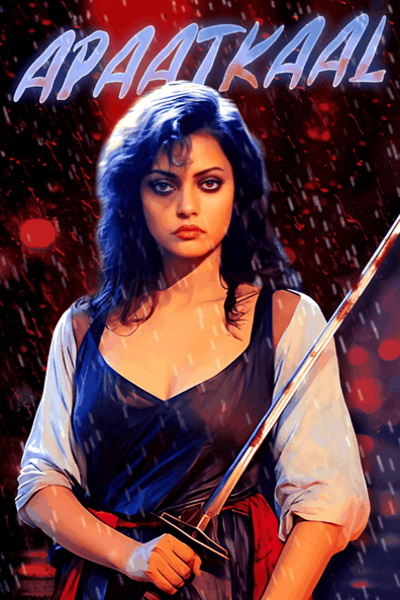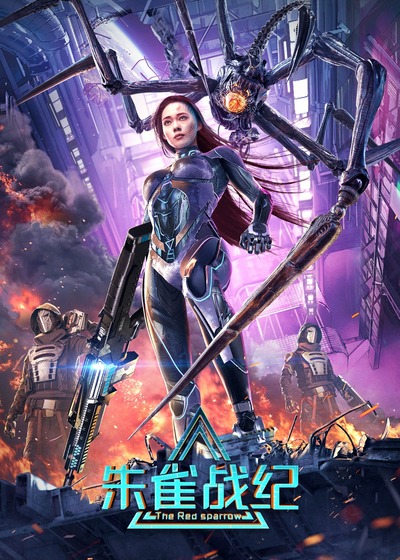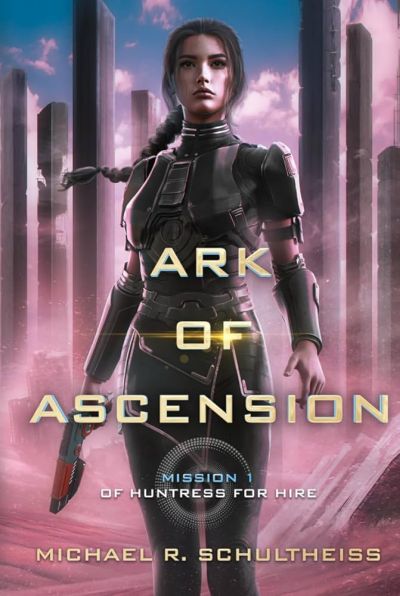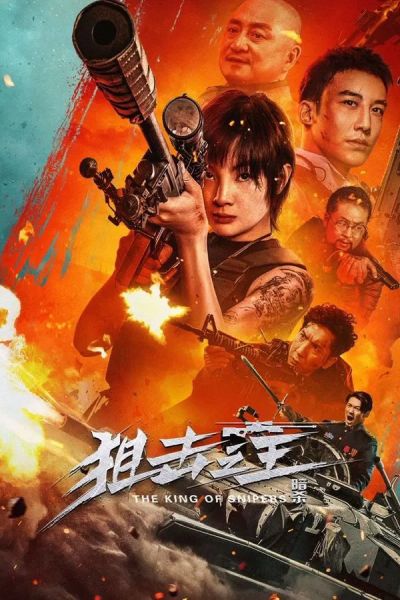★★½
“Death Wish, Bollywood style.”
 For the first hour and forty minutes, you may well be wondering why this is here. You will need to be patient: it gets there… eventually. However, to start with, it’s the story of the battle between crime boss Nikka Shaitan (Grover) and dogged cop Inspector Sidhu (Kumar). After members of the former’s gang are caught attempting a bullion robbery, Sidhu seeks to leverage them to reach their boss. But Shaitan uses all the power – both legal and illegal – at his disposal, to avoid justice. Initially, a state of martial law (the title translates as “emergency”) gives the cops the edge, but after that is declared over, the balance shifts, culminating in Shaitan’s gang invading Sidhu’s wedding and gunning everybody down.
For the first hour and forty minutes, you may well be wondering why this is here. You will need to be patient: it gets there… eventually. However, to start with, it’s the story of the battle between crime boss Nikka Shaitan (Grover) and dogged cop Inspector Sidhu (Kumar). After members of the former’s gang are caught attempting a bullion robbery, Sidhu seeks to leverage them to reach their boss. But Shaitan uses all the power – both legal and illegal – at his disposal, to avoid justice. Initially, a state of martial law (the title translates as “emergency”) gives the cops the edge, but after that is declared over, the balance shifts, culminating in Shaitan’s gang invading Sidhu’s wedding and gunning everybody down.
Shaitan again avoids justice, getting a corrupt politician to give him an alibi, leading to his acquittal. This is where we finally achieve GWG relevance, for the Inspector’s bride, Shikha (Sabah), vows to take revenge on every single person responsible for the death of her husband. She delivers, taking them out in a variety of ways, from shooting repeatedly in the head after removing their tongue, through burning alive, to hacking apart with a sword. It’s certainly enthusiastic, though the execution isn’t nearly as much fun as it should be. It demands a lot more blood. Naturally, Shikha uses the gang’s tactics to escape legal punishment, the film ending in a large caption asking the audience, “Do you agree with this?”
Well, since you ask… It’s a typical early nineties Indian pot-boiler, with all that implies. So, it’s overlong at 144 minutes, stuffed with terrible songs (and I like some Bollywood music – Singh is Kinng is one of only two soundtracks I actually listen to outside the film), and painfully simplistic, rarely approaching any level of delicacy. By most standards, this is not a “good” movie. But I did find it interesting. As depicted here, Indian cops do not give a damn about civil rights; how much of that’s due to the declared state of emergency is unclear (there was such a two-year period in India, but earlier, from 1975-77). On the other hand, the courts are depicted as incompetent and/or corrupt, basically useless at dispensing justice.
The sudden blossoming of Shika in the final act is also surprising. It’s rare for a film to end up with its hero or heroine being one who is barely even a supporting role during the first two-thirds. However, Rao manages to pull the switch off, albeit mainly through killing everyone else who you liked to that point. Shikha, assisted by her friend Razia, as well as another survivor of the massacre, then goes to work after the legal system has failed her, in a way which makes Charles Bronson look like subtle understatement. This is a clarion call to the vigilante inside the audience, about as subtle as a brick, and all the more fun for that. I’d edit this down to eighty minutes and call it a vast improvement.
Dir: V. Subba Rao
Star: Sabah, Gulshan Grover, Kiran Kumar, Aatish Devgan





 This is not to be confused, in any way, with the
This is not to be confused, in any way, with the  I don’t subscribe to the belief that authors need to be the same sex, race, religion or whatever as their characters. A good author can put you inside the head of their heroine, even if they’re a different species, an extra-terrestrial, or whatever. But there needs to be an authenticity of voice for it to work. This is where, for example, Quentin Tarantino fails for me: his characters almost always end up sounding like Quentin Tarantino. And I wrote that before noticing the blurb on Amazon actually says, “Jerry Furnell exudes a Quentin Tarantino vibe in his narrative.” That’s meant as an incentive; I’d have taken it as a warning.
I don’t subscribe to the belief that authors need to be the same sex, race, religion or whatever as their characters. A good author can put you inside the head of their heroine, even if they’re a different species, an extra-terrestrial, or whatever. But there needs to be an authenticity of voice for it to work. This is where, for example, Quentin Tarantino fails for me: his characters almost always end up sounding like Quentin Tarantino. And I wrote that before noticing the blurb on Amazon actually says, “Jerry Furnell exudes a Quentin Tarantino vibe in his narrative.” That’s meant as an incentive; I’d have taken it as a warning. Fair play to Woollard and his team for making a feature movie with no resources to speak of. The problem is, watching this, it’s painfully obvious that they had no resources to speak of. Two space-suits and a fog machine are not enough for a film, especially in a genre like science-fiction, which tends to rely on spectacle. Oh, smaller scale works can still be remarkably successful: the night before this, I watched glorious and highly recommended time-travel film Beyond the Infinite Two Minutes. But if you’re not going to offer epic scale, you need to have something else to repay the audience. An hour and three-quarters of watching characters stumbling about in the gloom is not it.
Fair play to Woollard and his team for making a feature movie with no resources to speak of. The problem is, watching this, it’s painfully obvious that they had no resources to speak of. Two space-suits and a fog machine are not enough for a film, especially in a genre like science-fiction, which tends to rely on spectacle. Oh, smaller scale works can still be remarkably successful: the night before this, I watched glorious and highly recommended time-travel film Beyond the Infinite Two Minutes. But if you’re not going to offer epic scale, you need to have something else to repay the audience. An hour and three-quarters of watching characters stumbling about in the gloom is not it. The easiest way to describe this is a Thai version of
The easiest way to describe this is a Thai version of  Well, this crashed and burned at the box-office in no uncertain fashion, taking in less than ten percent of its $55 million budget. While not surprising – dark fantasy doesn’t exactly have a good track record of late – it is a bit of a shame. I loved the look of the film, which is often spectacular, reminding me of things like The Chronicles of Riddick in a willingness to step back and overwhelm the viewer with scale. I am, of course, contractually obliged to watch anything with Milla Jovovich in it, and she’s her usual good value here. Bautista had a solid track record too, and he’s certainly appropriate for the role. But then, there’s the plot…
Well, this crashed and burned at the box-office in no uncertain fashion, taking in less than ten percent of its $55 million budget. While not surprising – dark fantasy doesn’t exactly have a good track record of late – it is a bit of a shame. I loved the look of the film, which is often spectacular, reminding me of things like The Chronicles of Riddick in a willingness to step back and overwhelm the viewer with scale. I am, of course, contractually obliged to watch anything with Milla Jovovich in it, and she’s her usual good value here. Bautista had a solid track record too, and he’s certainly appropriate for the role. But then, there’s the plot… Amazon Prime doesn’t have the best reputation for its original movies. Indeed, I’m hard pushed to think of one which I’d want to watch again. That record is unchanged after this, a fairly ludicrous Die Hard knock-off which even an Oscar winner like Viola Davis can’t do much to salvage. It’s another in the recent series of “president in peril” films. When your movie takes inspiration from the likes of Olympus Has Fallen, you’re setting the bar low from the get-go. Then cobble together a script involving the three boogeymen of current culture – AI, cryptocurrency and white men. Finally, pretend Kamala Harris won the election, and was a military-trained bad-ass. Given all this, two stars is probably an achievement.
Amazon Prime doesn’t have the best reputation for its original movies. Indeed, I’m hard pushed to think of one which I’d want to watch again. That record is unchanged after this, a fairly ludicrous Die Hard knock-off which even an Oscar winner like Viola Davis can’t do much to salvage. It’s another in the recent series of “president in peril” films. When your movie takes inspiration from the likes of Olympus Has Fallen, you’re setting the bar low from the get-go. Then cobble together a script involving the three boogeymen of current culture – AI, cryptocurrency and white men. Finally, pretend Kamala Harris won the election, and was a military-trained bad-ass. Given all this, two stars is probably an achievement.  This would be a creditable little film, if the makers could ever be bothered to finish it. Yeah, it ends in what is supposed, I presume, to be some kind of cliffhanger. But it botches the landing badly, first by leaping forward two weeks instead of showing us the climax to which things have been leading up. Then, it just… ends, without resolution in any of the major plot threads. It’s a shame, because to that point, if doing nothing particularly new, this is competent in its execution, and I’ve seen a lot worse. It gets the basics right, with a half-decent story and characters: in the urban genre, this is sadly less common than you would hope.
This would be a creditable little film, if the makers could ever be bothered to finish it. Yeah, it ends in what is supposed, I presume, to be some kind of cliffhanger. But it botches the landing badly, first by leaping forward two weeks instead of showing us the climax to which things have been leading up. Then, it just… ends, without resolution in any of the major plot threads. It’s a shame, because to that point, if doing nothing particularly new, this is competent in its execution, and I’ve seen a lot worse. It gets the basics right, with a half-decent story and characters: in the urban genre, this is sadly less common than you would hope. I don’t necessarily expect to understand a literary universe from the first page. These things take time: I get that. But I do expect that, as I go through the chapters, things will become clear. If I reach the end, and am still vague on a number of significant plot points, then something has gone wrong. Sadly, it’s the case here, and that largely hampered the effectiveness of the narrative. In this case, it had a cascading effect. Because I didn’t understand one situation, that rendered a character’s purpose uncertain, and this then meant the heroine’s motivation wasn’t clear.
I don’t necessarily expect to understand a literary universe from the first page. These things take time: I get that. But I do expect that, as I go through the chapters, things will become clear. If I reach the end, and am still vague on a number of significant plot points, then something has gone wrong. Sadly, it’s the case here, and that largely hampered the effectiveness of the narrative. In this case, it had a cascading effect. Because I didn’t understand one situation, that rendered a character’s purpose uncertain, and this then meant the heroine’s motivation wasn’t clear. The Chinese title is 狙击之王:暗杀, which Google Translate informs me translates as “Sniper King: Assassination”. I don’t want to assume anyone’s gender, but I think I’m going to go with the alternate title above, as more appropriate, over the one on the poster. Because there’s no doubt about the amazing talents possessed by Anna (Yang), for whom a shot at three kilometers range is barely an inconvenience. We get right into the action with her being committed as a psychopath after begin captured, following her assassination of a drug lord. Yet another drug lord, actually – she has a deep hatred of them, for reasons we eventually discover, and has been taking them out with regularity.
The Chinese title is 狙击之王:暗杀, which Google Translate informs me translates as “Sniper King: Assassination”. I don’t want to assume anyone’s gender, but I think I’m going to go with the alternate title above, as more appropriate, over the one on the poster. Because there’s no doubt about the amazing talents possessed by Anna (Yang), for whom a shot at three kilometers range is barely an inconvenience. We get right into the action with her being committed as a psychopath after begin captured, following her assassination of a drug lord. Yet another drug lord, actually – she has a deep hatred of them, for reasons we eventually discover, and has been taking them out with regularity. It’s not long before someone tries to kill her in the psychiatric facility, but she’s able to escape (somewhat), with the help of struck-off former doctor, Nasipan (Tao). However, she is forced, with the aid of a nano-bomb injected into her bloodstream, to take a mission for Artest (Mak). There’s a war of succession going on in the country of “Libiwala”, with the prospect of drug production becoming legal in the country – to the joy of crime boss Roger (Lee). Artest requires Anna to liquidate all those in line for the leadership to prevent this. Or maybe encourage this. It’s all a bit murky, and the plot twists and turns until the very last scene, though never gets incoherent.
It’s not long before someone tries to kill her in the psychiatric facility, but she’s able to escape (somewhat), with the help of struck-off former doctor, Nasipan (Tao). However, she is forced, with the aid of a nano-bomb injected into her bloodstream, to take a mission for Artest (Mak). There’s a war of succession going on in the country of “Libiwala”, with the prospect of drug production becoming legal in the country – to the joy of crime boss Roger (Lee). Artest requires Anna to liquidate all those in line for the leadership to prevent this. Or maybe encourage this. It’s all a bit murky, and the plot twists and turns until the very last scene, though never gets incoherent.